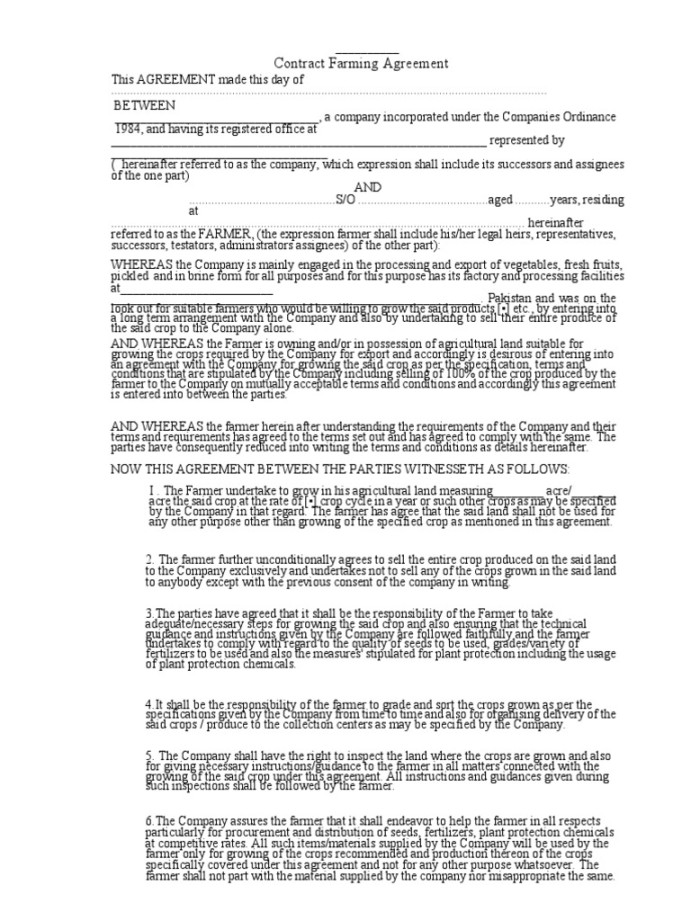A share farming agreement is a legally binding contract between a landowner (landlord) and a farmer (tenant) that outlines the terms and conditions of agricultural land use. This agreement typically involves the sharing of production costs, profits, and risks between the parties. A well-drafted agreement is crucial for ensuring a smooth and successful farming operation while mitigating potential disputes.
1. Essential Clauses:
Land Description:
Precisely describe the land being farmed, including acreage, boundaries, and any relevant features (e.g., water sources, access roads). Consider including a map or aerial photograph for clarity.
Clearly define the start and end dates of the agreement. Specify whether the agreement is for a single season, multiple seasons, or a specific term with renewal options.

Image Source: scribdassets.com
Land Use:
Outline the permitted agricultural practices. Specify the crops to be grown, livestock to be raised, and any restrictions on land use (e.g., no chemical fertilizers, organic farming practices).
Clearly define the landlord’s obligations, such as:
Clearly define the tenant’s obligations, such as:
Detail the agreed-upon profit and loss sharing arrangement. This may involve:
Specify insurance requirements for both parties. This may include crop insurance, liability insurance, and property insurance.
Outline the process for resolving any disputes that may arise. This may include mediation, arbitration, or litigation.
Clearly define the grounds for termination of the agreement by either party. This may include breach of contract, bankruptcy, or unforeseen circumstances.
Specify the governing law and jurisdiction for the agreement.
2. Design Considerations:
Professional Formatting:
Use a clean and professional font (e.g., Arial, Times New Roman) with consistent formatting throughout the document. Use headings and subheadings to improve readability.
Use plain and unambiguous language that is easy to understand for both legal and non-legal professionals. Avoid legal jargon whenever possible.
If specific laws or regulations are referenced, ensure accurate and proper legal citations.
Use ample white space to improve readability and make the document visually appealing. Use bullet points and lists to organize information effectively.
Include spaces for both parties to sign and date the agreement. Consider including witness signatures as well.
Include a version history at the end of the document to track any changes made to the agreement.

Image Source: scribdassets.com
3. Legal Review:
Consult with an Attorney:
It is highly recommended to have the agreement reviewed by an experienced agricultural attorney. An attorney can ensure that the agreement is legally sound, protects the interests of both parties, and complies with all applicable laws and regulations.
4. Maintaining the Agreement:
Regular Communication:
Maintain open and regular communication between the landlord and tenant throughout the term of the agreement.
Any changes or modifications to the agreement should be documented in writing and signed by both parties.
Review and update the agreement periodically to reflect changing circumstances or new legal requirements.
By carefully considering these elements, you can create a professional and effective share farming agreement that protects the interests of both the landlord and the tenant while fostering a successful and productive agricultural partnership.
This comprehensive guide provides a framework for creating a share farming agreement template. However, it is important to remember that every farming situation is unique.
Disclaimer: This information is for general guidance only and does not constitute legal advice. You should consult with an attorney to discuss your specific circumstances and obtain legal advice tailored to your needs.